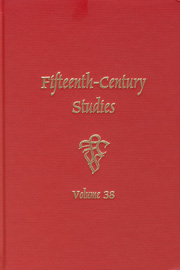Book contents
- Frontmatter
- Contents
- A Monastic Reformation of Domestic Space: Richard Whitford's Werke for Housholders
- Two Cultural Perspectives on the Battle of Lippa, Transylvania, 1551: Whose Victory Is It?
- Interpreting Sir Gawain and the Green Knight: Translation and Manipulation of Audience Expectations
- The Dry Tree Legend in Medieval Literature
- The Book of the Duke and Emperor: A New Edition and Interpretations within the Manuscript Context of MS. Manchester, Chetham's Library 8009 (Mun. A.6.31)
- Margery Kempe and the Spectatorship of Medieval Drama
- Wessel Gansfort, John Mombaer, and Medieval Technologies of the Self: Affective Meditation in a Fifteenth-Century Emotional Community
- Discerning Voices in the Trial of Joan of Arc and The Book of Margery Kempe
- Book Reviews
Interpreting Sir Gawain and the Green Knight: Translation and Manipulation of Audience Expectations
Published online by Cambridge University Press: 05 September 2013
- Frontmatter
- Contents
- A Monastic Reformation of Domestic Space: Richard Whitford's Werke for Housholders
- Two Cultural Perspectives on the Battle of Lippa, Transylvania, 1551: Whose Victory Is It?
- Interpreting Sir Gawain and the Green Knight: Translation and Manipulation of Audience Expectations
- The Dry Tree Legend in Medieval Literature
- The Book of the Duke and Emperor: A New Edition and Interpretations within the Manuscript Context of MS. Manchester, Chetham's Library 8009 (Mun. A.6.31)
- Margery Kempe and the Spectatorship of Medieval Drama
- Wessel Gansfort, John Mombaer, and Medieval Technologies of the Self: Affective Meditation in a Fifteenth-Century Emotional Community
- Discerning Voices in the Trial of Joan of Arc and The Book of Margery Kempe
- Book Reviews
Summary
An academic commonplace holds that a translator's choices ultimately affect an audience's interpretation of a text. The semantic value of any single word relies on a matrix of context and signification, a rather tenuous structure for all readers, but especially from the translator's perspective. As Umberto Eco says in Experiences in Translation, “a good translation is not concerned with the denotation but with the connotation of words.” Words possess general cultural and historic meanings especially relevant to all readers in the time for which they were written, and isolation of one facet of an entire text, whether by a translator or critical scholar, leads to excluding other interpretations. For this study, I will analyze translation strategies in two different versions of Sir Gawain and the Green Knight, J. R. R. Tolkien's and Simon Armitage's renditions, to highlight how each translator maneuvers readers to interpret the character of the Green Knight in divergent ways, both from each other and from the original. I have selected passages treating the Green Knight because this figure has repeatedly been commented upon as enigmatic for academics and general readers alike, captivating in part due to his own peaceful avowals and apparent magical nature, but labeled an anomaly for these same ostensibly paradoxical aspects. My research will focus on linguistic alterations the translators made concerning the Green Knight's mortal or magical nature, his gear and other personal effects, and his personality characteristics.
- Type
- Chapter
- Information
- Fifteenth-Century Studies 38 , pp. 41 - 64Publisher: Boydell & BrewerPrint publication year: 2013



